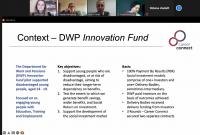
After the preparation for a new personal occasion in Kecskemét, Hungary, the SIBdev Family had to make a tough decision again and move the event online due to the deterioration of the Covid pandemic situation. However, this move did not prevent the participants from sharing something personal in addition to the professional content, starting with the view from their (home) office windows and continuing with so many different points of view.

The meeting was held between 8th and 10th February 2022 and besides the regular management issues and the presentation of Small Scale Action updates, also involved the 6th Masterclass coordinated by Ad-hoc expert Maria Chiara Pizzorno with many exciting presentations from invited SIB professionals and a closing workshop with lessons learned from them.

The session was started by Mila Lukic, founder and CEO of Partner of Bridges Fund Management UK, a social enterprise that brings together government and charity partners to design and deliver more effective services. Mila has explained that outcome contracts/SIBs can be more effective than traditional investments in social services because they can handle multiple problems that do not fit into one specific policy area.
Within their enterprise they have identified three crucial elements that lead to a successful return on investments: Collaborative Design, Flexible Delivery, and Clearer Accountability. Collaborative Design means that services are co-designed by the people who actually deliver and use them instead of individual government departments, Flexible Delivery allows learning real time, making changes while the project is going, while Clearer Accountability refers to the special attention paid to the quality of data collection and regular communication with the investors.

During the second lecture, Simon Bean, Director of Business Development of Career Connect UK has presented their working method in the area of unemployment prevention among young people. Career Connect is a large charity working across the North-West of England that delivers wide ranging programmes and services that support young people and offenders by enabling them to access and succeed in education, training and employment. Between 2012 and 2018 Career Connect delivered two Social Impact Bonds (SIBs) commissioned by the national government that supported over 8,300 young people in the Liverpool City Region who were at high risk of becoming Not in Education Employment or Training (NEET) or who were NEET.
The first SIB focused on young people who were in social care, who were young offenders or who had special educational needs and disabilities, while the second SIB tackled the rising incidence of lower level mental health and wellbeing issues that were an increasing characteristic of local NEET young people. Both SIBs achieved or exceeded the performance indicators which was due to a wide range of factors like strong, local client pipeline, close cooperation with other agencies, flexibility, responsiveness and the focus on early intervention. Besides these, a key to success was the introduction of a new staff role, namely the ‘Coach’ who works intensively with young people and provides support tailored to their individual needs.

The lecture of Oliver Jacobs, a former leader of a mental health and employment charity called Twining Enterprise focused on the Individual Placement and Support model, a form of employment support for people with mental health problems and its adoption in the UK. Oliver has explained how the focus on competitive employment, zero exclusion, consistency with people’s preferences, quick working, and the integration with health services and employer engagement have lead to success. Just like Career Connect, Twining Enterprise has also put great emphasis on the coaching process, based on the strong belief that employment is a health issue in itself.

On top of the lectures related to the theoretical background and practical consequences drawn by professionals working with SIBs, a special highlight of the meeting was the presentation of Anna Carrie. As a leader of a wide range of charities Anne has talked about the power of storytelling and personal life interventions by sharing her own experiences of a transition from someone in need to someone who helps. Born in a seriously disadvantaged area of Scotland Anne Carrie has experienced incredible depths in her personal life that most people couldn’t have overcome. The fact that she did is due to personal interventions, starting with a teacher who told her that her best is always good enough to a philanthropist showing her how important it is to make people from being part of a problem to being part of the solution, an approach that has not only saved Anne Carrie from the violent gang culture she almost stuck in, but also gave her an asset to work with in her profession now. During her lecture the whole audience have struggled with their tears, making hers a real worthy window to look out of and a crucially important point of view to understand.

